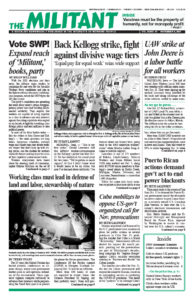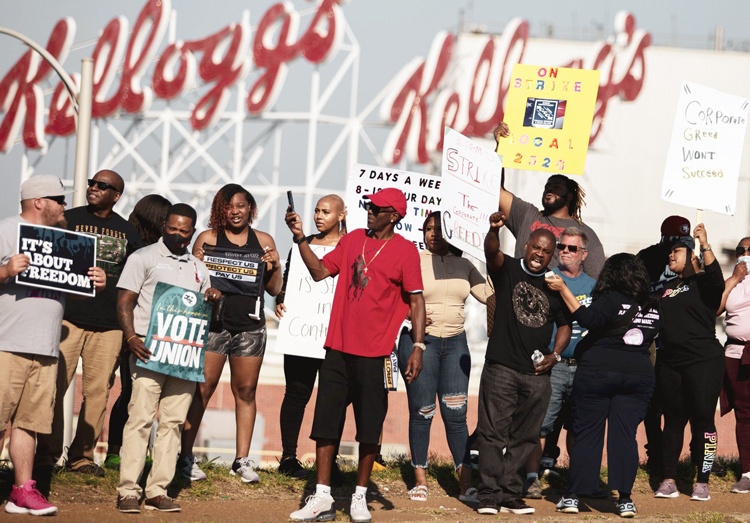MEMPHIS, Tenn. — “This is my first strike,” Gerald Lawrence told this Militant worker-correspondent on the Kellogg’s picket line here Oct. 22. He has worked at the cereal plant for two years. “We’ve gotten so much support! At first I didn’t know what it would mean to be on strike, but now I’ve learned about solidarity. I’ve learned about our history here, going back to the 1968 sanitation workers’ strike” when Martin Luther King Jr. came to provide support.
Lawrence is one of 274 members of Bakery, Confectionery, Tobacco Workers and Grain Millers Local 252G who walked out Oct. 5, along with BCTGM union members at Kellogg’s cereal plants in Battle Creek, Michigan; Omaha, Nebraska; and Lancaster, Pennsylvania — more than 1,400 altogether.
While the union asks local members to picket in four-hour shifts at one of the two plant entrances every third day, many put in more hours. Some come every day. The main picket line in front of the plant is on Airways Boulevard, a busy thoroughfare heading to the nearby airport. Honks and shouts of support for the strikers from passing motorists and truck drivers are nonstop, all day and all night.
Local 252G hosted a solidarity barbeque Oct. 23 that drew some 100 union local members, their families, supporters from several area unions, the NAACP and others from the community, including a contingent from the Beale Street Corvette Association, whose membership includes several strikers. They drove their lovingly cared-for cars in a contingent to the picket line.
“Equal pay for equal work” is one of the most popular signs on the picket line, reflecting union members’ strong opposition to Kellogg’s demand that the union agree to a new, permanent two-tier wage and benefit setup that would deepen divisions among workers.
The company wants to boost its profits by making permanent two classes of workers — “legacy” employees hired before 2015 and “transitional” workers, who will never reach the same pay and benefits of longtime employees.
“After the 10-month lockout in 2013-14, we settled that 30% of the workforce here could be ‘transitional’ workers,” said Local 252G member Scott Evans, a maintenance mechanic who has worked at the plant for nine years. “Part of the agreement was that those workers would move up to full pay and benefits over time. But that never happened, except for a few that replaced workers who retired.
“Now the company wants to remove the cap of 30% on the number of ‘transitional’ workers they can hire,” Evans said. Longtime employees would keep their wages, pensions and health insurance for now, “but there would be nothing for the ‘transitionals,’ who will be more and more of the workforce.”
As the Bakery Workers union website explains, “The Company is trying to divide the workforce by asking the current workforce to sell out the next generation of Kellogg workers.”
Like many Kellogg’s strikers, Evans is inspired by the number of other strikes going on around the country, including the strikes earlier this year at Frito-Lay and Nabisco, both organized by the BCTGM, and the current strike of 10,000 United Auto Workers at John Deere. “I told my wife that 2021 is going to go down in the history books!” he said.
John Deere workers are fighting for higher wages and against imposition of a third-tier setup for workers at that company.
“I took the job at Kellogg’s because I thought I had a chance to become a ‘legacy’ employee,” said Nicole Alexander, who has worked at the plant since April. As a ‘transitional’ worker, she makes $19.92 an hour, compared to $33 an hour for longtime workers, she said. “We get no pension, only a 401(k) plan, and have to pay much more for our health insurance. They want us to use vacation days instead of using Family and Medical Leave,” a federal program that allows workers to take unpaid time off when they need it for medical or family reasons.
“At the same time, we’re making millions for Kellogg’s,” she added. “We worked seven days a week all through the pandemic. We had co-workers who died from COVID. And this is how the company treats us.”
Kellogg’s reported global sales of $3.6 billion in the last quarter, and profits of some $380 million.
“How could we agree to a permanent two-tier setup?” Local 252G Vice President Kevin Bradshaw told the Militant. “It would mean two classes of membership in our union and we would be divided among ourselves. We can’t sell out our future.”
Workers at the Memphis plant make Corn Flakes, Frosted Flakes, Apple Jacks, Rice Krispies and other Kellogg’s cereals.
The international union has prominently displayed on its website — BCTGM.org — two special features, “Facts Behind the Kellogg Strike” and “5 Ways to Support the #KelloggStrike.” They contain information helpful to winning support to the fight from fellow workers, explain where you can join their picket lines, and where you can send a message of solidarity or a contribution to each of the four union locals on strike.
Kellogg’s announced Oct. 25 it had offered to restart contract talks with the BCTGM, including on the two-tier setup.
“You think about all the money they are spending to try to break us, but can’t agree to equal pay and benefits,” Bradshaw wrote on the local’s Facebook page Oct. 24. “If you think this is not war then you need to wake up! Come too far to turn around all we can do now is turn the pressure up!”


